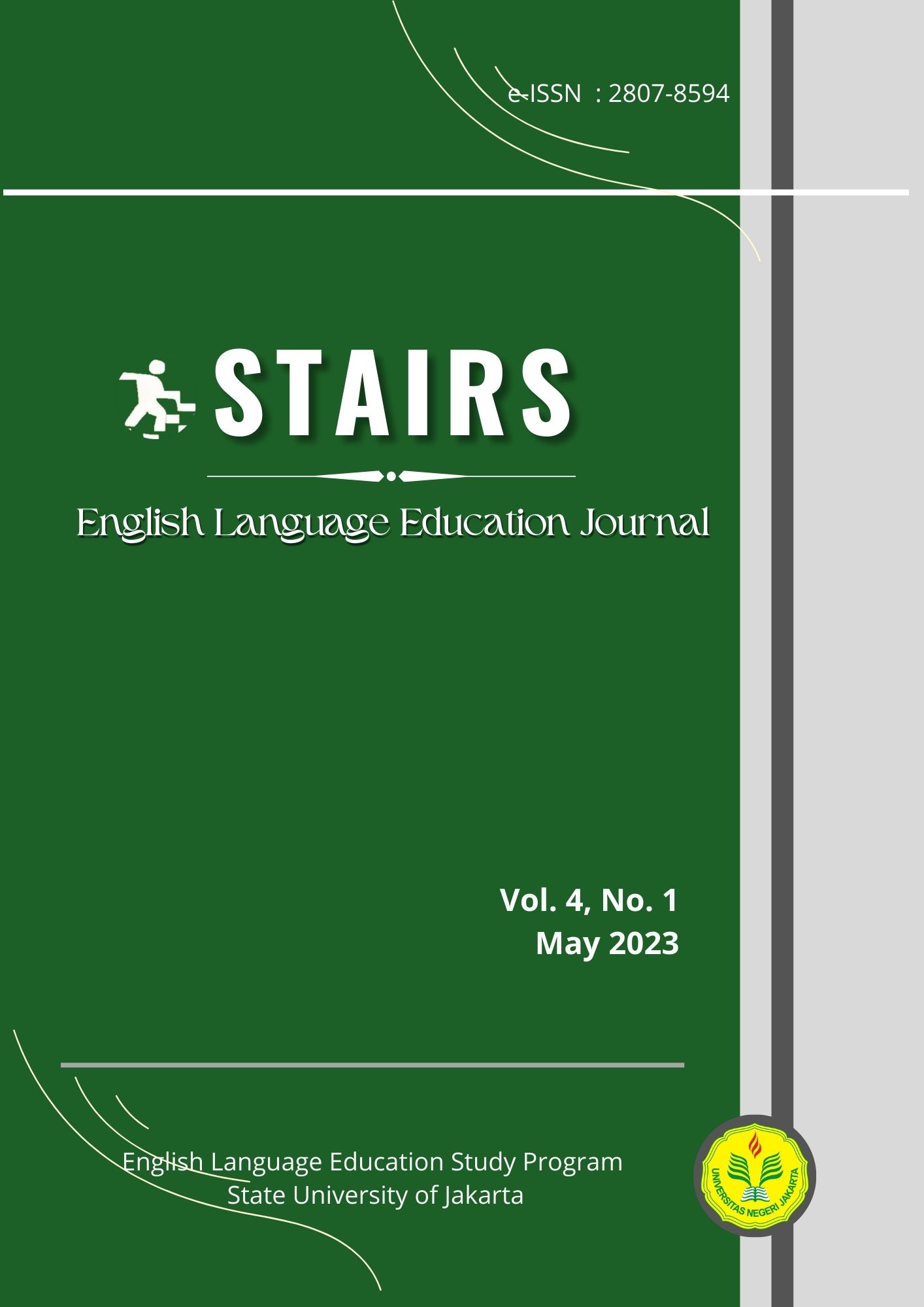The Incorporation of the 4C Skills in the Lesson Plans of Grade Eight
DOI:
https://doi.org/10.21009/stairs.4.1.5Keywords:
4C Skills, Collaboration, Communication, Creativity, Critical Thinking, Lesson PlanAbstract
This research aimed to investigate the incorporation of the 4C skills in the lesson plans and to analyze how the 4C skills were implemented into the lesson plans of English for grade eight. The data for this qualitative content analysis research was gathered by analyzing ten lesson plans for grade eight of junior high school in Bekasi and Jakarta. The research found that all the lesson plans included all the 4C skills, which comprised 51% of communication skills, 69% of collaboration, 61% of critical thinking, and 69% of creativity. As the most widely incorporated, collaboration and creativity were found in learning and assessment activities. These findings are expected to be a recommendation for scholars, especially English teachers in designing lesson plans that meet 21st-century skill needs.
References
Adhami, N, & Taghizadeh, M. (2022). Integrating Inquiry-based Learning and Computer Supported Collaborative Learning into Flipped Classroom: Effects on Academic Writing Performance and Perceptions of Students of Railway Engineering. Computer Assisted Language Learning, https://doi.org/10.1080/09588221.2022.2046107.
Ariyana, Y., Pudjiastuti, A., Bestary, R., & Zamromi, Z. (2018). Buku Pegangan Pembelajaran Keterampilan Berpikir Tingkat Tinggi: Program Peningkatan Kompetensi Pembelajaran Berbasis Zonasi. Direktorat Jendral Guru dan Tenaga Kependidikan.
Belda-Medina, J. (2021). Promoting Inclusiveness, Creativity, and Critical Thinking through Digital Storytelling among EFL Teacher Candidates. International Journal of Inclusive Education. https://doi.org/10.1080/13603116.2021.2011440.
Fadel, C., Bialik, M., & Trilling, B. (2015). Four-Dimensional Education: The Competencies Learners Need to Succeed—Center for Curriculum Redesign.
Ghofur, Abd. (2022). Digital Comic Media on Smartphones to Improve Communication Skills. Journal of Innovation in Education and Cultural Research, 3(3), 432-444.
Griffin, P., McGaw, B., & Care, E. (2012). The Changing Role of Education and Schools. In P. Griffin, B. McGaw, & E. Care (Eds.). Assessment and Teaching of 21st Century Skills (pp. 1-16). Dordrecht, Germany: Springer Science+Business Media B.V.
Hall, B. M. (2013). Designing collaborative activities to promote understanding and problem-solving. International Journal of e-Collaboration, 10(2).
Kivunja. (2014). Teaching Students to Learn and to Work Well with 21st Century Skills: Unpacking the Career and Life Skills Domain of the New Learning Paradigm. International Journal of Higher Education, Vol. 4, No. 1.
Lai, Emily; DiCerbo, Kristen; Foltz, Peter. (2017). Skills for Today: What We Know about Teaching and Assessing Collaboration. New Jersey: Pearson.
Lai, E. R., Yarbro, J., DiCerbo, K., & de Geest, E. (2018). Skills for Today: What We Know about Teaching and Assessing Creativity. London: Pearson.
Levin-Golberg, J. (2012). Teaching Generation Tech with the 4Cs: Using technology to integrate 21st-century skills. Journal of Instructional Research, Vol 1.
Metusalem, R., Belenky, D. M., & DiCerbo, K. (2017). Skills for Today: What We Know about Teaching and Assessing Communication. London: Pearson.
Oza, Preeti. (2022). Learning English Language and Communication Skills Online during COVID-19 Pandemic: Opportunities and Challenges. Open Journal of Social Sciences, Vol.10 No.2, 2022.
PERMENDIKBUD Permendikbud No. 22 and 23 of 2016 accessed 01/03/2022 https://bsnpindonesia.org/wpcontent/uploads/2009/06/Permendikbud_Tahun2016_Nomor022_ Lampiran.pdf
Radifan, M. F., & Dewanti, R. (2020). The Incorporation of 4C Skills in Senior High School English Teachers' Lesson Plans. STAIRS: English Language Education Journal, 1(2), 75-87.
Robinson, K., & Aronica, L. (2015). Creative Schools: Revolutionizing Education from the Ground Up. Australia: Penguin UK.
Smulowitz, Stacy. (2017). Document Analysis. The International Encyclopedia of Communication Research Method, 1-8. https://doi.org/10.1002/9781118901731.iecrm0071.
Snyder, L. G., & Snyder, M. J. (2008). Teaching Critical Thinking and Problem-Solving Skills. The Delta Pi Epsilon Journal, 1(2), 90–100.
Tamela, E., & Dwi, M. H. (2021). Four C's Skills Integration in the Lesson Plans of Grade 7 English Teacher. Jo-ELT (Journal of English Language Teaching), 8(2), 124-138.
Terasne, T., & Sugianto, N. (2019). The Effectiveness of Using Preview, Question, Read, Reflect, Recite and Review (Pq4R) Toward Students' Critical Thinking Ability on Reading Comprehension. Jo-ELT (Journal of English Language Teaching), 6(1), 35. https://doi.org/10.33394/jo-elt.v6i1.2348.
The Partnership for 21st Century Learning. (2019). Framework for 21st Century Learning: Definition.
Ventura, M., Lai, E., & DiCerbo, K. (2017). Skills for Today: What We Know about Teaching and Assessing Critical Thinking. London: Pearson.
Wagner, T. (2010). The Global Achievement Gap. New York: Basic Books.
Wahab, A., & Terasne, T. (2020). The Effect of Inquiry-Based Learning on Students' Critical Thinking in Reading. Jo-ELT (Journal of English Language Teaching), 7(1), 26. https://doi.org/10.33394/jo-elt.v7i1.2690.
Zhao, C., Pandian, A., & Mehar Singh, M. K. (2016). Instructional Strategies for Developing Critical Thinking in EFL Classrooms. English Language Teaching, 9(10), 14. https://doi.org/10.5539/elt.v9n10p14.



